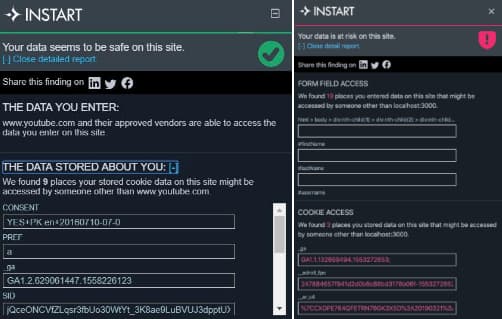While many of us are comfortable in giving away certain data of ours like email addresses, the same doesn’t hold true for our sensitive information. With that in mind, we carefully choose which companies to share our data with, will my data be responsibly handled or sit insecurely in some third-party server?
Yet, despite the precautions we may take, there are times that certain websites just happen to fool us. They appear legitimate, claim to have a strict privacy policy (hello boilerplate users) but end up sharing your data with third parties regardless.
See: Dodging bad passwords with Google’s new tool
Luckily, to help you not be fooled in such cases, Instart – a cloud security company – has released a new Chrome extension by the name of Privacy Alert.
The plugin allows you to check the “data security rating” of every site which basically indicates whether it is a good idea to share your data with the site in question or not.
Privacy Alert lets you know if hackers could potentially steal the information you type into a web form or save within a cookie. For example, if you visit a financial site, like your online banking app, and type in your username and password, the plugin will show if third-parties could potentially also view those login credentials, the company said a blog post.
For example, the screenshot below obtained from a report shown when visiting a certain reveals how your data may be shared with 9 other places through cookies, one being Google Analytics. On the other hand, it lets you know that your sensitive data is safe nonetheless.

In light of the above example, those of you who are aware of the recent rise in web skimming would know that this privacy tool will drastically reduce the chances of users being compromised. In cases where hackers have gained access to a site and infected it with malicious code, users won’t need to wait for a chance to stumble upon a company issued a press release, they will know instantly the moment they actually visit the site with Privacy Alert showing them a report.
For instance, we saw a couple of weeks ago how a payment page of the Commonwealth Bank in Australia was being cloned. If users had verified the site’s security status before making the payment, in that case, they wouldn’t have fallen for the ploy.
See: Meet Aztarna, a tool to find vulnerable Internet-connected robots
Hence, to conclude, we would recommend users to try out this new privacy tool, not because it just happens to be an additional tool newly released out there but because of its essence in acting as a precautionary measure for your security.
However, it wouldn’t be wise to leave everything to just a plugin and there it is recommended to employ other security measures as well such as minimizing the very process of entering payment details through the use of services like Apple Pay & verifying the security certificates of the sites you visit.
Did you enjoy reading this article? Like our page on Facebook and follow us on Twitter.

Nice information on this.
Nice!
Is it free